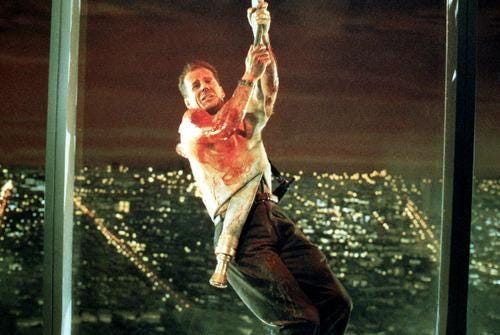Why 'Die Hard' will always be Bruce Willis's legacy
Proving people wrong is richer than a shiny award.
There’s something deeply rich about proving people wrong. The ones who stood in front of your confidence by refusing to believe you were good enough. The legacy of that misdirection gathers power over time, a firm reminder that the people who doubt you can also be the ones who help make you. Take Bruce Willis for example.
Back in the mid-to-late 1980s, he wasn’t known for much more than comedy. Moonlighting and a breakthrough film debut in Blind Date pegged Willis as a career funnyman, not the guy who would dive off the top of Nakatomi Plaza trying to save innocent bystanders in a tank top and no shoes. But John McTiernan and 20th Century Fox thought differently, at least initially.
One of Netflix’s most wonderful gifts the past couple of years was the miniseries called The Movies That Made Us. One of the episodes covered Die Hard, offering viewers a glimpse at the tumultuous journey that the production took from set to screen. The biggest hurdle was a reported lack of trust in a Willis-led action film doing enough at box office to match the big budget (at the time) July 1988 release.
When the trailer first premiered, the crowd reaction was so poor-as in they were laughing unintentionally at the sight of a less-than-brawny Bruno dispensing justice to terrorists looking to rock a California skyscraper-the studio pulled Willis’s face off the poster. The entire marketing campaign shifted off a reaction. The one below was only returned to its original glory after the film proved to be a success.
Test reactions can be a make or break ordeal for the first film in a possible franchise, even though McTiernan never thought there would be a sequel with how erratic of a path the movie took to the screen. Once it got there, the worries didn’t immediately die.
Die Hard grossed just $605k in its first weekend, but word of mouth carried it to the finish line quick. It went on to collect $83 million domestically and $141 million worldwide on a $28 million budget. The risk was worth the reward and then some, because the initial box office success is nothing compared to the phenomenon it started.
Along with four sequels, two of which that came close to the original’s success, the movie spawned hundreds of similar action stories and films. “Die Hard on a Bus” was Speed. Enter the title and add a location that will make the hero sweat for two hours. Few, if any, did it as well as Willis.
Unlike the brawnier 80s action heroes, he was built like a regular Joe, a cop with a decent athletic build. There weren’t bulging biceps or a martial art at his disposal, just a need to save the day and break a lot of rules doing it. Anybody who ever dared break the rules and get the job done probably watched a Die Hard movie. He didn’t have a Navy jet like Pete Mitchell; just a pistol, a tank top, khakis, and no shoes or socks.
The movie still spins like a dime today, 35 and a half years after its release. The Christmas debate and tag has helped that notoriety, one that I firmly stand on the side of including enough Christmas elements to be a holiday staple. But it’s more than that theory can ever reach, standing as its star’s giant F-U to his doubters.
The studio doubted Willis. The audience doubted him; the ability to transmit genuine laughs in an action hero role. He didn’t need muscles, just brains and charisma-along with a patented ability to land a good joke on a bad guy’s doorstep.
That ability landed him several jobs and roles for the next two decades, including top tier ones like Pulp Fiction, where he plays a guy who shares many qualities with McClane. Willis made it look easy and relatable, carving out his own niche after the public only figured him for a comic touch. He merely parlayed that into a new career route, one followed by many. Ryan Reynolds owes his career to Willis, even if he added a six pack.
McClane was the hero you wanted to share a six pack of beer with, because he didn’t look like a typical hero.
The only sad part is watching a rocker like Die Hard, and then realize how rough of a state Willis is in currently due to a battle with aphasia and dementia. He’s been reduced to being uncommunicative, starving the public and his loved ones from access from a proper serving of Brunoisma.
Thank goodness for cinema’s undying urge to stick around, long after their heroes have declined. There’s a lot of ways to look at the career of Bruce Willis, someone who never saw an Oscar nomination yet skated around the mark a couple of times.
Here’s how I look at it. Proving his bosses and audience wrong in a massive way with Die Hard, kicking off decades of accolades and money making, is richer than an award. That’s a true legacy.
Thanks for reading and head over to the Hi-Pointe Theater on December 22 for a showing of a true classic. Don’t leave Christmas without it.






